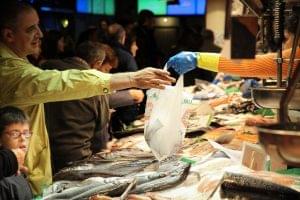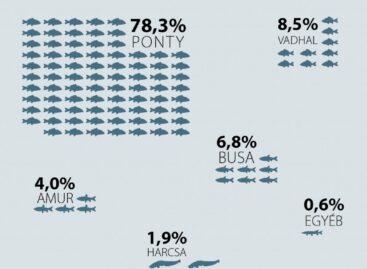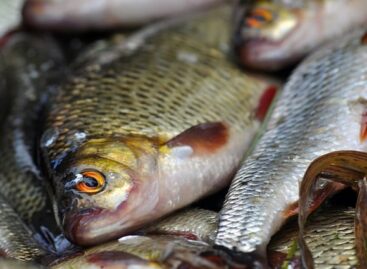There will be enough fish for the necessary plantings and to meet Christmas needs
The extreme drought and the drastic rise in feed and energy prices presented the fish production sector with new challenges this year, despite this, according to professional organizations, there will be enough fish from the ponds to stock fish for fishing and to satisfy the population’s Christmas needs.

(Photo: Pixabay)
At the joint press conference of the Hungarian Aquaculture and Fisheries Association (MA-HAL), the Hungarian National Fishermen’s Association (MOHOSZ) and the Balatoni Halgazdálkózi Nonprofit Zrt. (BHN) held in Keszthely on Wednesday, István Németh, the president of the MA-HAL, said that the 26,000-hectare this year, the huge drought, which had not been seen in 121 years, caused a serious problem in the Hungarian lake farms of the entire area, which most severely affected the fish ponds with dams in the Transdanubian valleys. Hundreds of hectares of lake surface dried up, and only half of the operating water level could be provided on thousands of hectares. Cormorants, herons, egrets and seagulls destroyed the fish stock that easily became prey in the shallow waters, he added. According to their estimates, the harvest in Transdanubia will be about 15-20 percent smaller this year, and since fish production is characterized by a three-year cycle, the decline in the region may reach 30 percent in the future, the president said. In the Alföld, where production takes place in round-fill lakes, the situation is more fortunate, because although with significant electricity consumption, these pond farms were able to be supplied with water, he added.
Due to the increase in costs, a kilo of carp could cost up to HUF 1,800-2,000 at Christmas – predicted the president of MA-HAL
In response to MTI’s questions, he said that while in previous years 18-22 percent of Hungarian fish production was exported, this year it is expected that this proportion will drop below 10 percent due to the uninterrupted domestic supply, even though, as he noted, high-quality Hungarian fish was in demand in neighboring countries. István Németh also spoke about the fact that the sector is hoping for HUF 18 billion in support from the Hungarian fish farming operational program starting next year. With the help of the 60 percent intensity subsidy, the producers would be able to implement significant technical developments, which would avoid traumas similar to this year’s – the president of MA-HAL opined. He added that he is confident that the sector will remain on its feet and that the area of pond farms in the country will not decrease significantly. He noted that the development of the spring fish supply is not yet predictable, it depends on many things. Lajos Szűcs, the president of MOHOSZ, informed that this year the number of registered fishermen in Hungary has risen to over 800,000. Most of the natural waters, more than 60,000 hectares, are managed by MOHOSZ, where about 4,800 tons of fish were planted at a cost of more than HUF 5 billion. He called it the task of the coming period to maintain the level of services, including fish stocking, and to supply the more than a thousand fish guards with appropriate equipment.
Zsolt Szári, the CEO of BHN, said that despite the rains of the last few weeks, the water level of Lake Balaton is still 50 centimeters short.
The drought that started at the end of last year had reached such a scale by this spring that they could not even fill up 55 hectares of the company’s pond farming areas, and hundreds of hectares could only be farmed with half or a reduced amount of water. By the end of the summer, a serious water shortage developed in several of their lake farms, which caused deaths in several places, and extraordinary fishing became necessary. Despite the difficulties, the company can fulfill its obligations to stock fish in Lake Balaton both in terms of quantity and quality, he said. He also reported that at the beginning of summer, together with Balatonboglár-based Halker Kft., the slaughtering and processing of the Balaton carp, which received EU protection of origin last year, started for restaurateurs. By expanding the production capacity, I would also like to meet the needs of the population in the future – he added. In response to MTI’s questions, the CEO said that BHN had sold 78,000 fishing tickets by the end of September, a thousand less than in the same period last year, but their income was HUF 15 million more, since the licenses purchased were more annual than period tickets.
MTI
Related news
Domestic fish production in ponds increased in 2024
A total of 22,838 tons of fish were produced in…
Read more >Fish consumption is becoming increasingly popular in our country
The Christmas fish offer and the results of domestic fish…
Read more >Fish prices do not increase in Hungary at Christmas – despite the summer heat, there is no problem with supply
Despite the summer heat and rising grain prices, there is…
Read more >Related news
Corporate leaders’ commitment to sustainability at record level
According to the latest data from the K&H Sustainability Index,…
Read more >FAO food price index rose slightly in June due to higher prices of meat, dairy products and vegetable oils
The Food and Agriculture Organization of the United Nations (FAO)…
Read more >What can cause the price of a wine to increase tenfold?
There are fewer of them worldwide than the number of…
Read more >






